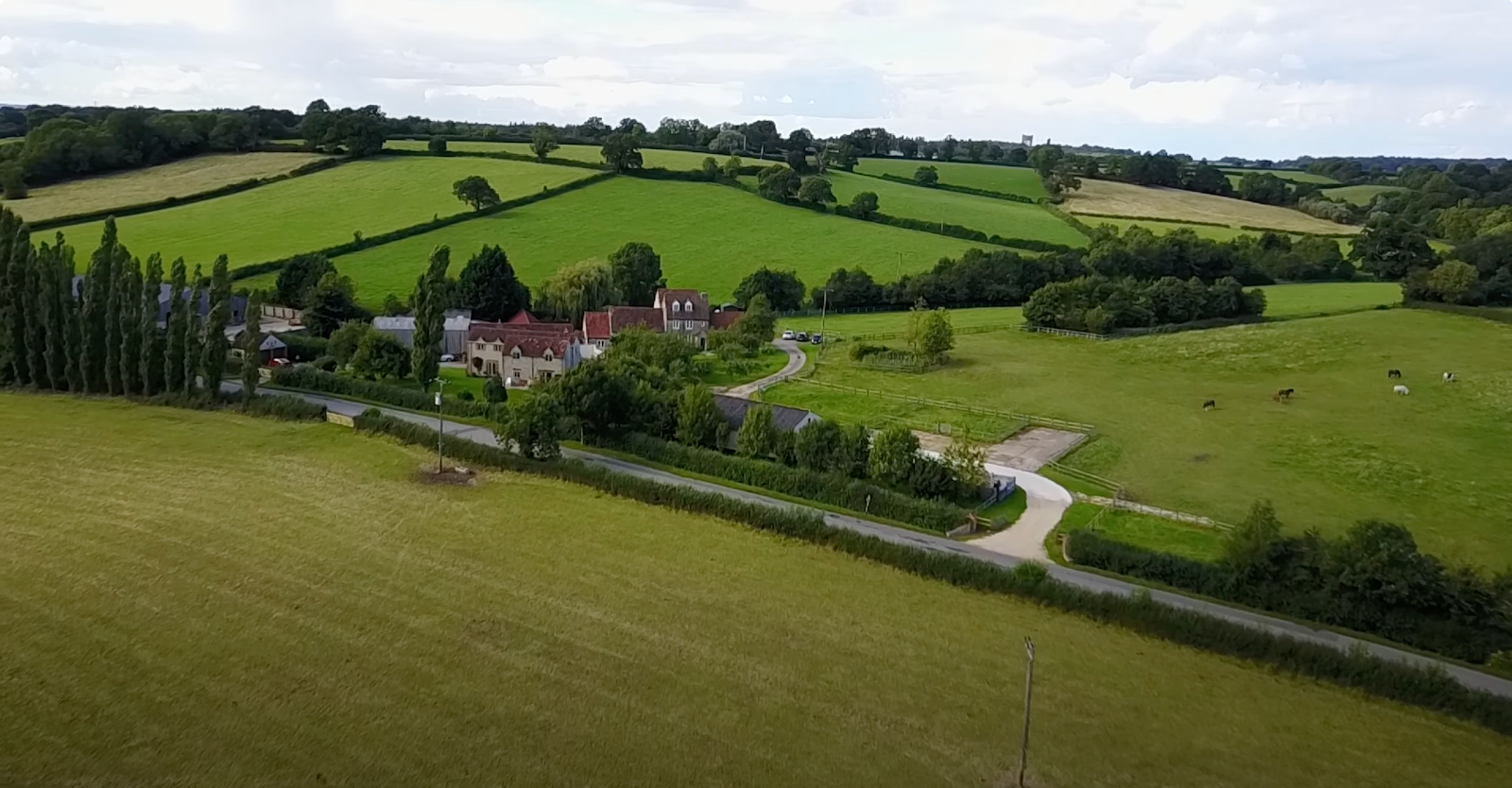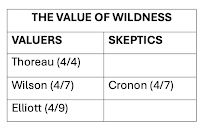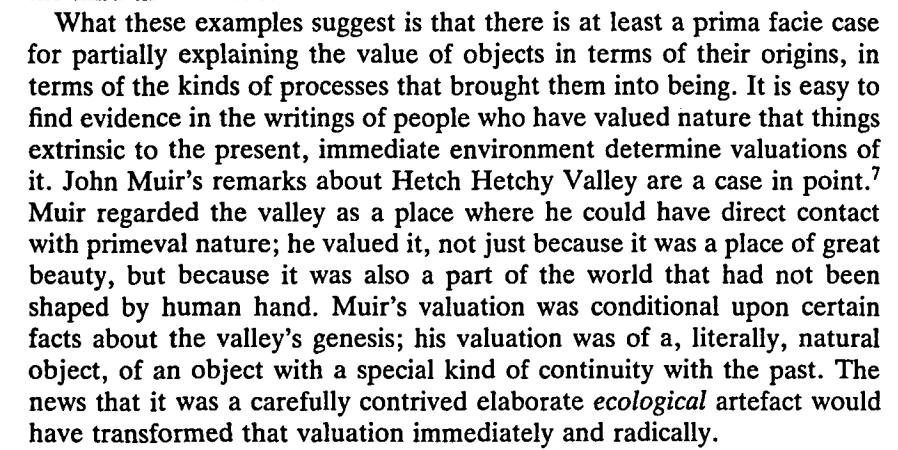- Please fill out an evaluation for this class at Canvas
- Please do the self-rating assignment asap (right now, even!)
- Add review topics to the workbook -- we'll use the final review page to review
- Congratulations to graduating seniors!
- See you next fall...for those talking Lifespan Ethics!
Search This Blog
Tuesday, May 6, 2025
MODULE 6: Review
Sunday, May 4, 2025
MODULE 6: Ecosabotage
AGENDA
- Ecosabotage
- Tuesday's class: review
- Lifestyle choices .... the just one person problem
- Politics.... voting, running for office .... conservatives vs. liberals
- Now: Activism, forms of protest
- Under Paris Agreement nations have made some progress, but not enough
- We are headed for greater than 2 deg centigrade temperature rise and all the resulting sea level rise, etc.
- They are pushing for faster change through protest
 |
| climate protests |
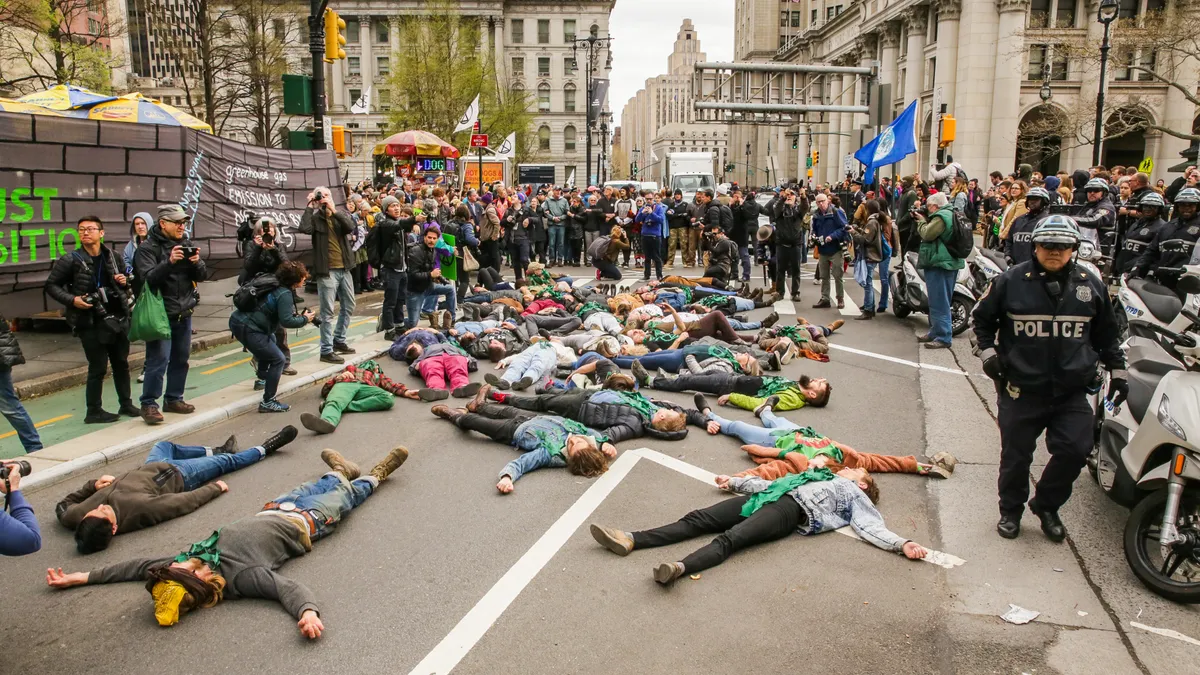 |
| Xtinction Rebellion stopping traffic |
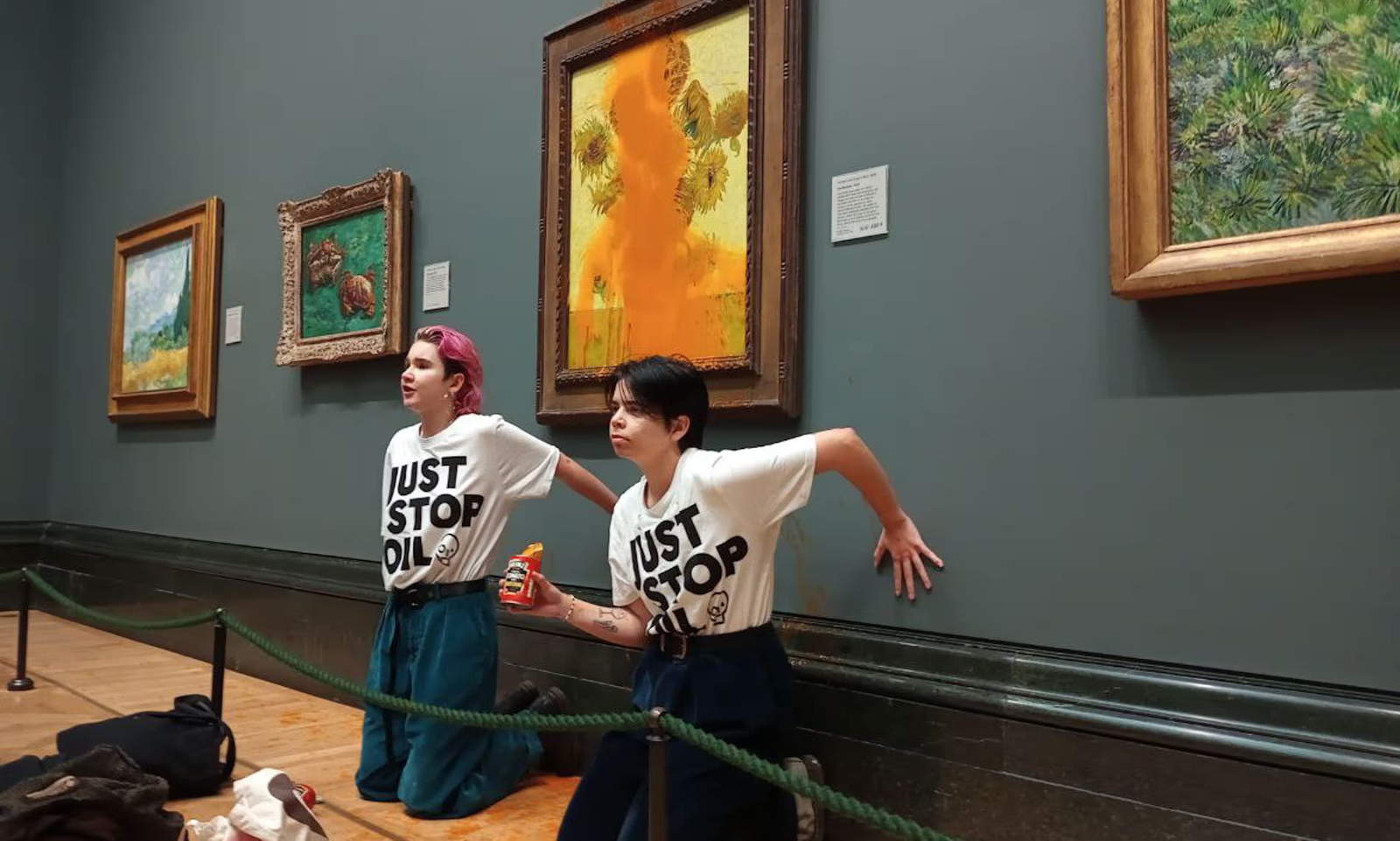 |
| Just Stop Oil attacks on art |
- outrageous, disruptive, impolite
- but still basically peaceful
- no harm to property or persons
- Are the illegal protesters going far enough?
- If climate change is going to cause vast death and destruction, why aren't protesters doing more?
- Why don't they move on to ECOSABOTAGE?
- Direct action--it stops some of the environmental harm that protesters want to prevent
- throwing soup at a painting is not direct action in this sense
- Involves property destruction
- But no violence against persons (Malm: so not terrorism)
 |
- Does everyone agree that ecosabotage is wrong? (show of hands)
- If we're all sure it's wrong, then the challenge is to explain WHY it's wrong -- there are many possibilities
- Property crimes have been a tactic of many successful protest movements (see below)
- The climate change movement is not different from these movements--not less important or less urgent, for example. THEREFORE
- Climate change activists should not limit themselves to peaceful protest.
- Suffragetttes (p. 41): London, beginning of 20th century--used property crimes as tactic to win vote for women (they split from the Suffragists, who used peaceful means)-- breaking windows, arson, throwing pepper at people. Came to an end with WWI.
- Abolitionism in the US
- Civil Rights movement--Martin Luther King vs. Malcolm X, peaceful protest plus riots
- Gandhi's movement for Indian independence from Britain--rejected violence against the British, but not against fighting with the British in WWI (p. 43)
- ANC and Nelson Mandela fighting apartheid in South Africa--mostly peaceful, but also "Spear of the Nation"
- Assume for the sake of argument that property destruction HAS been a justifiable and effective tool of some past protest movements
- Why is it the wrong tool in the case of the climate change activism?
- Pipelines are killing people, so destroying them is death-prevention.
- Destroying pipelines is like defusing a bomb set to explode in an apartment building.
- Pipelines are property, not persons.
- It won't solve the problem, but will rachet up pressure on the oil industry to solve the problem. THEREFORE
- Attacking pipelines is justifiable.
- Tone of Malm's book is desperation--we have tried everything and nobody's doing enough.
- Suppose you had a chance to calm him down. What would you say?
- Are we doing enough?
- Are there other ways to hasten change besides blowing up pipelines?
Friday, May 2, 2025
MODULE 6: Can conservatives be environmentalists?
AGENDA
- Discuss Scruton, "Conservatism Means Conservation"
- personal choices -- we've covered
- pollitics -- today
- activism -- next time
- Democrats enact pro-environment policies
- Biden--inflation reduction act, Justice 40 initiative, rejoined Paris Agreement; ended drilling in ANWR
- Republicans undo them
- Trump's environmental record so far (follow link please!)
- Today's Republicans -- very focused on growth, American dominance
- Past Republicans
- Conservatives in 1970s--supported EPA, Clean Water Act, Clean Air Act, Endangered Species Act
- Teddy Roosevelt (Republican president, 1901 - 1909) established many National Parks
- Conservativism as a philosophy -- how does it view the environment?
- British philosopher who has written on the philosophy of conservatism
- You read "Conservatism means Conservation"
- "Conservation is the quintessential conservative cause"-- p. 2
- He also wrote a book making this argument -->
- His theory of conservatism is rooted in political thinking of Edmund Burke and others
- Departs from US conservatives--not as focused on individual freedom, growth, and free markets
- conservative: has love of home, wants to preserve and protect home
- "it is the love of home that provides the most effective motive on which the environmental movement can call"--p.2
- Do you think home is a local concept for him? What about America as our home, or even the earth as our home?
- liberal: focused on good of all, the least advantaged, equality
Does it make a difference where you live?
 |
| Where we live |
- conservative: wants to conserve resources and ways of life; see themselves as stewards or trustees
- there ought to be a "partnership between the dead, the living and the unborn" -- p. 2, cites Edmund Burke
- liberal: progress, not preservation
Application (he doesn't discuss here): he supports fox hunting, other types of hunting (banned in the UK in 2014); in the US: Ducks Unlimited
- conservative: looks for local solutions
- liberal: supports government solutions at all levels including global (the UN)
Local action: neighborhood association that cleans creek, girl scout troop that keeps highway clean, civic association that protests new highway or train tracks
- conservative: supports private property, capitalism; but growth can be incompatible with love of home and love of beauty
- liberal: distrusts; worries about greed leading to depletion
Application: environmental problem of suburbs
- "The most important man-made environmental problem in this country is that presented by the spread of the suburbs. Suburbanization causes the increasing use of automobiles, and the dispersal of populations in ways that exponentially increase the consumption for energy and non-degradable packaging" -- p. 3
- If Americans want to live in the suburbs, its only because government policies have made them desirable--subsidies, problems in the inner cities, zoning
- Poundbury (p. 4-5)
- Preserving endangered species that are not particularly remarkable--the delta smelt, devil's hole pupfish, snail darter
- Dextinction of dire wolves, adding lions or elephants to England (like Monbiot discusses)
- Unfair distribution of garbage as an environmental issue (Wenz vs. DeLuca)
- Trump's opening up national lands for logging
- Trump's proposal to weaken the Endangered Species Act
- How to address climate change--mititagion vs. adaptation vs. geoengineeering
Thursday, May 1, 2025
MODULE 6: Collective Action
AGENDA
- Hourdequin
- The just one person problem -- if a collective effort, is impactful, but my contribution is not, do I still have to contribute? e.g. buying an electric car
- The tragedy of commons -- if it would benefit me to add one more sheep to the shared pasture (while the negatives are shared), why shouldn't I do it?

- Confucius -- Chinese philosopher 551-479 BC (before Socrates-Plato-Aristotle)
- extremely central to Chinese culture, to the present day
- the relational self--not I, but we--family, community, country, world
- moral models
 |
- choosing to buy an electric car--"I'm just one person, it's not going to make any difference"
- Hourdequin--
- I'm never just one isolated person
- I'm an influencer! And I'm influenced by moral models
- you make your decisions with others "watching"
- that can and should motivate me to buy the electric car
_________________________
- Hardin: only solution is "mutual coercion mutually agreed upon" (laws)
- Hourdequin: laws can change, so it's important for there to be an ethical solution in addition to laws
- Hardin: ethics can't motivate people to act responsibly
- Hourdequin/Confucius: need to think about how individuals are affected by moral models/can be moral models
- The shepherd doesn't want to add an excess sheep because that's not what model shepherds do
- People in Europe don't want more than two children because that's not what model citizens do
- We aren't tempted to litter, because that's not what model citizens do.
- Driving small cars/electric cars has become the norm in other countries (Europe, maybe China) and can become the norm here without laws requiring it
- Hourdequin says our purchasing behavior follows the Confucian model, even if we don't live in a Confucian society. We make choices to buy an electric or hybrid car, or other green technologies, because we're emulating people we see as moral models. She sees this sort of ethical foundation for buying behavior as more secure than laws, which can change, but recently a lot of people have stopped buying Teslas because they've stopped seeing Elon Musk as a moral model. Are moral models just as shifting as laws?
Friday, April 25, 2025
MODULE 6: Do our choices matter?
Agenda
- final review page (under construction)
- Recycling follow-ups
- Just one person problem -- Jamieson
- Preview--for Monday, Hourdequin, another solution to the just one person problem. drawing on Confucian ideas
Recycling follow ups
- Dallas Recycling Award!
- Republic Services (tours!)
- Plastic has a very low recycling rate (5%)
- Some plastic does get recycled -- milk jugs, detergent bottles, soda bottles
- Paper, glass, and aluminum have much higher recycling rates compared to plastic
- Collected waste that's not recycled can ....
- go to a landfill
- get exported to poor countries and improperly dumped
- Reduce, reuse, recycle
Lots of people recycling coke cans --> far fewer new cans
One member of this crowd recycling --> fewer new cans
Yes I can make a difference!
- skip Sunday drive
- fly less
- turn down heat and air conditioning
- buy electric car
- ride a bike
Lots of people do these things --> less warming, less flooding, lives saved
One member of the crowd doing these things --> less warming, less flooding, lives ??????????
- Collectively, mitigation efforts are effective
- It doesn't automatically follow that my mitigation effort is effective
- The cumulative model doesn't apply.
- The threshold model doesn't apply.
- There aren't any other models. THEREFORE,
- My mitigation effort may not be effective.
- these are models of the efficacy of one person in a group that has an impact
- 1000 torturers (let's not contemplate!)
- Go Fund Me --1000 people give $10 apiece to someone who lost their job and needs living expenses
- My $10 allows them to buy groceries
- Applies to coke can recycling
- Jamieson--atmospheric science rejects this model for mitigation efforts
Threshold model-- "no effect occurs unless a specific level of collective contribution is achieved" (Jamieson p. 3)
- Go Fund Me -- 1000 people give $10 apiece o someone who needs to buy a car for $10,000
- I'm the first donor; my $10 doesn't buy anything but gets us closer to the threshold
- Jamieson--atmospheric science rejects this model for climate change related behaviors
Jamieson: "For all practical purposes climate change damages are insensitive to individual behavior." (p. 4)
Note: a simple way of expressing his point is "my effort is just a drop in the ocean, so tantamout to doing nothing"....but he doesn't exactly say that!
_________________________
Suppose my mitigation efforts have no impact. Should I still make the effort?
What would Utilitarians say?
- trying adds meaning, even if you don't succeed
Wednesday, April 23, 2025
MODULE 6: Green choices
AGENDA
- Plan for module 6
- The "just one person" problem
- Recycling
- Green choices. The "just one person" problem. (4/23, 25, 28, 30)
- Politics. Conservativm and environmentallism. (5/2)
- Activism
- Large-scale lifestyle changes are (often) effective
- But can changing my lifestyle make a difference, considering I'm just one person?
- If YES, should I do it?
- If NO, should I still do it?
_________________________
How we answer these questions will depend on the green choice
CASE 1: LITTERING
- On a large scale not littering is effective
- But can my not littering make a difference, considering I'm just one person?
- If YES, should I do it?
- If NO, should I still do it?
- On a large scale recycling is effective
- But can my recycling make a difference, considering I'm just one person?
- If YES, should I do it?
- If NO, should I still do it?
- --
- --
- --
- On a large scale recycling coke cans is effective
- But can my recycling make a difference, considering I'm just one person?
- If YES, should I do it?
- If NO, should I still do it?
Monday, April 21, 2025
MODULE 5: Urban ecology
- Alagona: city nature
- Some ethical questions about city nature
- its value
- should we rewild cities (report)
- our responsibilities for city nature
- If time: the endangered species act
- Ecologists thought of nature and cities as separate
- If ecologists wanted to study nature, they studied forests, deserts, coral reefs, prairies, etc.
- More recently, a new focus on nature IN cities
- Cities are ecosystems, but atypical -- dominated by one species (us), import/export a lot, bright, loud, constantly changing, polluted (Alagona ch. 6)
- seeing a wild bald eagle
- Alagona: the bald eagles of Pittsburgh, translocated from Canada, watched via webcam
- Was it ho-hum because not wild...boring...depleted
- Or pretty cool?
- adding "controlled" nature: Arboretum, Klyde Warren Park
- rewilding a city--how is that different?
- all animals have interests we should take into consideration
- but we have special obligations when we're responsible for their problems
- bridge over Mara river (wildebeest problems not due to humans)
- bridge over LA freeway (mountain lion problems are due to humans
- eaglets not imperiled by humans
- but does their proximity make them part of our community?
- rescue efforts
- Covers plants and animals that are threatened or endangered
- For listed species, (a) federal government can't take actions that further endanger, and (b) harming is prohibited on public and private land, and (c) US Fish and Wildlife must design and implement a recovery plan
- Harming is direct (hunting, fishing) OR indirect (habitat destruction)
- Passed with broad bipartisan support in 1973, signed by President Nixon
- proposed change: species protected "only from intentional killing or injury like through hunting or trapping"
- species would no longer be protected from habitat loss
- for this change: logging, mining, oil and gas industries
- against this change: environmental organizations
Wednesday, April 16, 2025
MODULE 5: Rewilding
AGENDA
- Urban ecology ideas
- Rewilding
- White Rock Lake (east side: birds but also trash)
https://maps.app.goo.gl/N5Gh4FmfYmtbE5RB7?g_st=i
Orange fencing is in front of tree - Eagle's nest (right)
- Arboretum - also relevant to "faking nature"
- Klyde Warren Park
- North of Dallas -- Heard Museum nature preserve
- Goat Island (super urban nature)
- Cedar Ridge preserve
- Live oaks in front of Dallas Hall!
- Bear Creek park
- Restoration -- returning nature to a past state -- before the mine, before the near extinction of buffalo, etc.
- Returning -- giving back parts of nature to indigenous people (for them to manage and conserve)
- Rewilding -- what is it?
- Aldo Leopold, ecological holism -- "A things is right when it tends to preserve the integrity, stability, and beauty of the biotic community. It is wrong when it tends otherwise." (Leopold p. 224-225)
- "integrity" -- native vs. invasive -- what belongs here?
- Monbiot -- it doesn't matter -- see list in Feral
- Peter Singer, Clare Pamer -- individual animals have moral status
- Monbiot -- in a better ecosystem there is more "animals eating animals"
- Some pro-animal authors would like to see less predation
- genetically alter the predators so they become hervibores (Kyle Johanssen, "The Wild Frontier of Animal Welfare")
- let predators go extinct (Jeff McMahan, "The Meat Eaters")
- Restoring vs. Rewilding
- Restoration--going back to a particular time
- Rewilding -- moving forward
 |
| Monbiot p. 10 |
- Chernobyl Nuclear Power Plant (Russia) (passive)
- Restoring wolves in Yellowstone (active)
- Urban rewilding
- Reintroducing keystone species -- beavers, lions, boar, moose, bison, lynx
- Dextinction
- Rewilding land formerly used for agriculture
- Rewilding oceans
- Trees for Life
- joining together private gardens
- fewer sheep!
- rewilding organizations: Rewilding Earth, Rewilding Europe, Rewilding Patagonia
Friday, April 11, 2025
Module 5: Returning the National Parks
AGENDA
- "Faking Nature" (Elliot)
- Report on the dire wolf
- Restoration vs. rewilding
- Treuer, returning the National Parks to the tribes
_________________________
Faking Nature (Elliot)
(A) Do restorations really have all the original features and functions?
(B) The art argument
"Straw man" version
- Nature is like art
- Origns matter when it comes to art (authentic vs. forged). THEREFORE
- Origins matter when it comes to nature.
"Steel man" version of his argument
- When it comes to art, origins matter (authentic vs. forged)
- Origins also matter in other cases--e.g. the object that turns out to be made of human bones (p. 85) .(and we could think of more cases --artifacts, people, etc.)
- We care about origins of nature as well
- the row of trees he values more when he thinks nature put them in a row
- nature writers who talk about untouched places (John Muir) THEREFORE
- Origins matter when it comes to nature.
_________________________
Restoration vs. Rewilding (next Wednesday)
- Restoration: Aim is to get back what was there before, returning to a past state
- Rewilding: A different aim, but sometimes the same methods
_________________________
_________________________
David Treuer, "Return the National Parks to the Tribes" (Atlantic Magazine May 2021).
- Connection to wildness debate
- Cronon--when we value wildness of nature, we are ignoring indigenous people who used to live on "wild" lands and were removed
- Let's turn our attention to them
Highlights from article below
What exactly is he proposing?
_________________________
Native Americans & US History
- First settlers saw US as wild and uninhabited but there were 5-15 million indigenous people here. (p. 32)
- Under the Indian Removal Act of 1830, Native Americans were driven west of the Mississippi.(p. 35)
- Reservations on barren land in the West were established in the mid 19th century. (p. 35)
- The Dawes Act (1887) gave parcels of reservation land to individual Native Americans and opened up the rest for purchase by white Americans. (p. 35)
- Native children were forced or coerced into attending boarding schools, where they were punished for speaking their own languages.
- Reservations are "sovereign nations" with their own laws, but don't have much commerce and are dependent on federal support (p. 34). The main commerce is "extractive industries, casino gambling, and tax-free cigarette sales" (p. 40)
- Tribal members don't want to lose their connection to their cultures. (p. 40, 41)
- People think National Parks "offer Americans the thrill of looking back over their shoulder at a world without humans or technology. Many visit them to find something that exists outside or beyond us...." (p. 32)
- When National Parks were established, Native Americans were removed to make them more wild.
- Treaties involved in making the parks were negotiated in bad faith and/or violated. (p. 32)
- Theodore Roosevelt, who established a large number of national parks and other preserves, had little respect for Indians. (p. 37)
- Native Americans still live near many of the parks. (p. 36)
- The Park Sevice "has made it easier for Native people to harvest plants for traditional purposes" but they have to submit paperwork (p. 42)
- Some allow Native people to hunt and trap (p. 42) but some prohibit all hunting (p. 43) It's up to the park service, even though the National Parks were originally Native homelands.
- For Native Americans," there can be no better remedy for the theft of land than land. And for us, no lands are as spiritually significant as the national parks. They should be returned to us. Indians should tend--and protect and preserve--these favored gardens again." (p. 33)
- Native people need permanent, unencumbered access to our homelands--in order to strengthen us and our communities, and to undo some of the damage of the preceding centuries." (p. 43)
- "The preservation of these sublime places for future generations is of course crucially important, something Native Americans understand as deeply as anyone." (p. 43)
- The federal government allows overcrowding and habitat loss and some administrations reduce park staff and allow development on public land (2021) (p. 43)
- "All 85 million cares of national-park sites should be turned over to a consortium of federally recognized tribes in the United States." (p. 44)
- This would give Native Americans "unfettered access" and "restore dignity that was rightfully ours." (p. 44)
- "To be entrusted with the stewardship of America's most precious landscapes would be a deeply meaningful form of restitution." (p. 44)
- Native Americans are accustomed to administering reservations, so have the required administrative skills. (p. 44)
- "...the transfer should be subject to binding covenants guaranteeing a standard of conservation that is at least as stringent as what the park system forces today, so that the parks' ecological health would be preserved--and improved--long into the future." (p. 44)
- "The federal government should continue to offer some financial support for park maintenance, in order to keep fees low for visitors, and the tribe would continue to allow universal access to the parks in perpetuity." (p. 44)
- Precedents for this kind of transfer to indigenous people: Uluru and the Nothern Territory in Australia (transferred to Aboriginal peoples) Whanganui River in New Zealand (transferred to Maori). (p. 44)
- Status Quo
- Stewardship under binding covenants (Treuer)
- Full, unlimited ownership -- should this be one position in debate?
- Judges group?
Wednesday, April 9, 2025
MODULE 5: Faking nature
AGENDA
- Recap of threats to wilderness/wildlife
- Preview: solutions (3 Rs)
- Restoration (today, next week)
- Returning to indigenous people (Friday + Debate Monday)
- Rewilding (next week)
The restoration thesis: environmental destruction can be "compensated by the later creation (recreation) of something of equal value" (Elliot, p. 81).He rejects the restoration thesis: "There is a dimension of value attaching to the natural environment which cannot be restored no matter how technologically proficient environmental engineers become" (p. 81)
- Dune example (p. 81)
- Moving a creek to accommodate a highway (p. 82)
- Restoring land after mining--Alaska
- Restoring rainforest in Brazil
- Restoring blackland prairie in North Texas
- Restoring wolves in Yellowstone (next week)
- Restoring eagles in the US (urban ecology, later)
- Restoring the dire wolf
- Restoring buffalo--
- at the brink of extinction at the end of the 19th century
- preserved by breeders and in zoos
- conservation movement decides to create herds
- buffalo from the Bronx zoo sent to Wichita wildlife refuge in Oklahoma
- contrast with buffalo herd at Yellowstone (not restored but highly managed)
- Restoration can be an intrinsic failure--some of the features and functions are lost (NOT HIS POINT!)
- When restoration is intrinsically successful, there's still loss of value
- because of change of origins: an "object's origins do affect its value and our valuations of it" (p. 85)
- Example: real Vermeer painting vs. fake Vermeer (p. 85)
- Fake nature -- lacks natural, wild origins--p. 86
- Our xperience of nature can be enhanced by beliefs about origins--p. 86
- What if I don't know? -- p. 88
"Of course I can be deceived into thinking that a piece of landscape has that kind of history, has developed in the appropriate way. The success of the deception does not elevate the restored landscape to the level of the original, no more than the success of the deception in the previous example confers on the fake the value of a real Vermeer." (p. 88)
_________________________He's not saying ...
- Not saying wild nature is the only thing we value--we may also admire aspects of a city or even a dam--p. 86 -- Dallas Arboretum -- trollstigen
- Not saying "natural is better" in all cases (diseases, etc.)--p. 87
- Not saying we should never alter nature
- Not saying we shouldn't restore...we should just realize we can't fully restore
_________________________
- "Art is different" objection: We care about the origins of an artwork because we judge that it's exceptionally high quality, but nature isn't judged in this way, so the case of art fails to establish the importance of origins for nature (p. 90)
- Preservation objection: Many natural places are preserved, and preservations alters their origins, so the effort to hold onto wild nature is doomed to failure. (p. 87)





